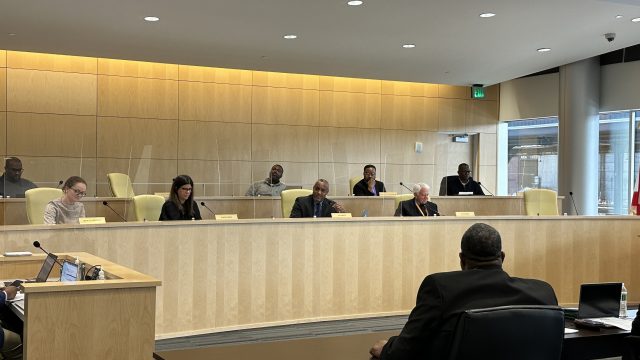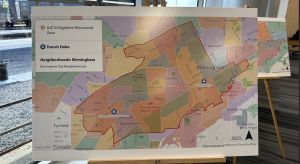
By Ryan Michaels
The Birmingham Times
The Birmingham-Jefferson County Transit Authority (BJCTA) board of directors on Wednesday voted to expand the service area and hours of ride-booking service Via, a low-cost transportation program already operating in the city.
Under the agreement with Via, the authority plans to provide rides, between the hours of 7 p.m. and 11 p.m., in an area which stretched much of the city’s center and reaches farther west than the Birmingham CrossPlex and as far east as the Forest Park-South Avondale neighborhood.
Currently, Via operates in a 6.7-mile area including downtown and some neighborhoods in Birmingham’s West Side and enables residents and visitors to use an app to call a ride.
Under the existing service, riders pay $1.50 per ride. The city just announced plans to extend its daytime Via service area to 19 neighborhoods on the East Side.
The city of Birmingham has contracted with Via since 2019 to provide its own low-cost rideshare service, branded Birmingham On-Demand. Charlotte Shaw, BJCTA CEO, said the transit authority made sure that its Via service would only pick up where the city’s leaves off.
 This expansion of service is the first time BJCTA has contracted with the service. Though funded by different entities, all service will be handled within the one Via app.
This expansion of service is the first time BJCTA has contracted with the service. Though funded by different entities, all service will be handled within the one Via app.
“The good thing about this, we’re not duplicating services with the city of Birmingham, and secondly, we were able to save because we are working in collaboration with them. Where they end at seven p.m….we pick up at seven,” Shaw said.
On, Terence McPherson, a representative of Via, said after 7 p.m. in Birmingham there are no public transit services that operate quickly enough for people to want to use them.
“On the nighttime, there are no routes (by anyone) that operate frequently, which really, we find is an enabler of very high ridership. The more frequent services, the more predictable it is, the more likely people are to ride,” McPherson said.
In deciding the service area, Via and the BJCTA sought to find ways to serve people engaging with Birmingham’s nightlife, particularly people who have their own cars but deem the current transit options undesirable, McPherson said.
“Working with [CEO Shaw] and her team, we came up with a zone that we think actually caters to some of those nighttime needs,” he added.
The wide scope of the area under BJCTA’s contract for nighttime service was intentional, McPherson said, because they didn’t want to leave out anyone with access to the service.
“We also wanted to make sure that there was a degree of equity in this plan, so we wanted to make sure that we’re covering a variety of neighborhoods across Birmingham, so it’s not just seen as only catering to one particular group or one particular area,” McPherson said.
Becky Carpenter, a Birmingham representative on the BJCTA board, said the plan was “incredible” and asked about how the authority plans to get out information about the service.
Shaw said Via, the BJCTA’s marketing team and the city of Birmingham are currently working to ensure that people know about the service.
“We’re going to co-brand the marketing to show that the city and BJCTA are working as well as communicate this out to all the neighborhoods and citywide,” Shaw said.
This first contract is a jumping-off point, said the CEO, as the authority has been meeting with other municipalities that BJCTA serves to discuss the future of micro-transit in the region.
“This is just the beginning of what you’re going to be seeing in the future with supplementing some of our services,” Shaw said.



